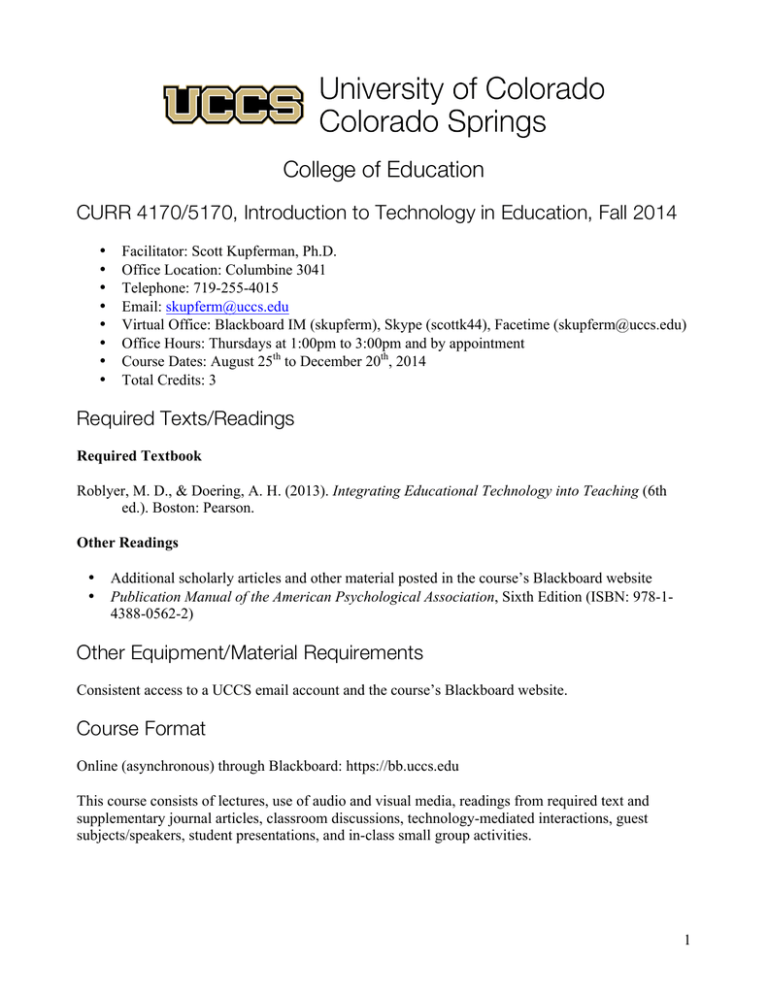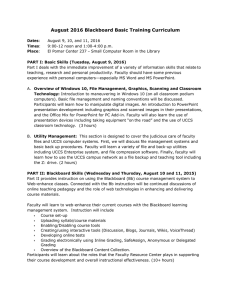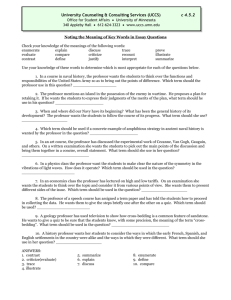College of Education
advertisement

College of Education CURR 4170/5170, Introduction to Technology in Education, Fall 2014 • • • • • • • • Facilitator: Scott Kupferman, Ph.D. Office Location: Columbine 3041 Telephone: 719-255-4015 Email: skupferm@uccs.edu Virtual Office: Blackboard IM (skupferm), Skype (scottk44), Facetime (skupferm@uccs.edu) Office Hours: Thursdays at 1:00pm to 3:00pm and by appointment Course Dates: August 25th to December 20th, 2014 Total Credits: 3 Required Texts/Readings Required Textbook Roblyer, M. D., & Doering, A. H. (2013). Integrating Educational Technology into Teaching (6th ed.). Boston: Pearson. Other Readings • • Additional scholarly articles and other material posted in the course’s Blackboard website Publication Manual of the American Psychological Association, Sixth Edition (ISBN: 978-14388-0562-2) Other Equipment/Material Requirements Consistent access to a UCCS email account and the course’s Blackboard website. Course Format Online (asynchronous) through Blackboard: https://bb.uccs.edu This course consists of lectures, use of audio and visual media, readings from required text and supplementary journal articles, classroom discussions, technology-mediated interactions, guest subjects/speakers, student presentations, and in-class small group activities. 1 Course Description This course explores the foundations, strategies, and tools for using technology as a means of engaging all students within inclusive educational settings. A focus is placed upon universal design for learning (UDL) as a framework for selecting, evaluating, and implementing educational technology hardware and software. We will explore the following topics this semester: • The “Big Picture” on Technology in Education • Today’s Educational Technology Skills: Standards and Assessments • Today’s Educational Technology Resources: Systems and Applications • Today’s Educational Technology Issues: Conditions That Shape Practice • Overview of Factors in Successful Technology Integration • A Technology Integration Planning (TIP) Model for Teachers • Technology Integration in Action (i.e., instructional software, simulation teaching functions, tutorial teaching functions, problem-solving teaching functions, integrated learning systems, etc.) • Accessible Technology and Universal Design for Learning • Teaching and Learning with Technology in: (a) English and Language Arts, (b) Foreign and Second Language, (c) Mathematics and Science, (d) Social Studies, (e) Music and Art, and (f) Physical and Health Education. Course Expectations Because this is an asynchronous course, students are expected be active learners in the Blackboard online environment. This means logging in often, participating in discussion board conversations, completing assignments on-time, and other common expectations of being a successful student. Course Objectives Upon successful completion of this course, students will be able to: 1. Identify the knowledge and skills teachers need to apply technology effectively in their classrooms. 2. Explore the broad range of 21st century hardware, software, and multimedia/hypermedia tools. 3. Discuss the technology resources and strategies that are universally designed and accessible for a broad range of students. 4. Demonstrate proficiency in using technology not only as a teaching tool, but also as a practical method of professional communication with students, families, and colleagues. 5. Investigate how technology resources and strategies are being used in each core content area: a. English and Language Arts b. Foreign and Second Language c. Mathematics and Science d. Social Studies e. Music and Art f. Physical and Health Education 2 Accreditation Standards Please refer to the Alignment of Course Objectives table at the end of this syllabus document. Technology Competencies It is expected that students begin our program with foundational technology skills that include digital word processing, digital and online formats (e.g. Blackboard) and using online research databases. Knowledge of the use of technology-supported multimedia, such as PowerPoint and other audio/video resources, is expected. Students who need assistance with building technological skills should speak with their professor to learn about technology resources in the COE and at UCCS. Using your UCCS email account is a requirement of this course due to digital delivery of course content. All students must obtain a UCCS email address and check it regularly (every day) so as not to miss announcements. If your UCCS email address is not your primary one, please have emails from UCCS rerouted to the one you check daily. Attendance, Preparation, and Participation Students are expected to maintain high standards of ethical and professional conduct. This includes attending class, being adequately prepared, contributing to class discussions, submitting high caliber work and representing your own work fairly and honestly. As an important member of a classroom community, attendance and punctuality is mandatory. You must actively engage in class and group work to maximize your learning in this course. Professional Behavior Professional behavior is necessary for you to be a successful member of a learning community. Please monitor your participation in class discussions and group work and find ways to contribute intelligently to the discussion without silencing others. All written assignments must be computer generated unless otherwise indicated by the professor. Professional behavior will be expected in your future teaching/counseling career and is often the hallmark of career success. Person-First Language Teacher candidates are expected to use person-first language when discussing or writing about persons with disabilities. People with disabilities are a minority group that has historically experienced prejudice and discrimination. As future teachers and citizens who foster equality among all people we must be conscious of how our language shapes meaning and reifies stereotypes. For example, the word handicap has historical origins related to begging. Further, phrases such as, “wheelchair bound” and “confined to a wheelchair” paint a very restrictive vision of what it is like to use a wheelchair. Instead people with disabilities more often refer to their wheelchair as tools of liberation. Please be aware of your language and what meaning it is conveying. 3 Diversity Statement The faculty of the College of Education is committed to preparing students to recognize, appreciate, and support diversity in all forms – including ethnic, cultural, religious, gender, economic, sexual orientation and ability – while striving to provide fair and equitable treatment and consideration for all. Any student who believes that he/she has not been treated fairly or equitably for any reason should bring it to the attention of the instructor, Department Chair or the Dean of the College of Education. Accommodations The College of Education wishes to fully include persons with disabilities in this course. In compliance with Section 504 and the Americans with Disabilities Act (ADA), UCCS is committed to ensure that “no otherwise qualified individual with a disability … shall, solely by reason of disability, be excluded from participation in, be denied the benefits of, or be subjected to discrimination under any program or activity…” If you are a student with a disability and believe you will need accommodations for this class, it is your responsibility to contact and register with the Disabilities Services Office, and provide them with documentation of your disability, so they can determine what accommodations are appropriate for your situation. To avoid any delay in the receipt of accommodations, you should contact the Disability Services Office as soon as possible. Please note that accommodations are not retroactive and disability accommodations cannot be provided until a “Faculty Accommodation Letter” from the Disability Services office has been given to the professor by the student. Please contact Disability Services for more information about receiving accommodations at Main Hall room 105, 719-255-3354 or dservice@uccs.edu. Military Students Military students who have the potential to participate in military activities including training and deployment should consult with faculty prior to registration for any course, but no later than the end of the first week of classes. At this time, the student should provide the instructor with a schedule of planned absences, preferably signed by the student's commander, in order to allow the instructor to evaluate and advise the student on the possible impact of the absences. In this course, the instructor will consider absences due to participation in verified military activities to be excused absences, on par with those due to other unavoidable circumstances such as illness. If, however, it appears that military obligations will prevent adequate attendance or performance in the course, the instructor may advise the student to register for the course at another time, when she/he is more likely to be successful. Student Appeals Students enrolled in programs or courses in the College of Education may access the COE Appeal/Exception Form at: 4 http://www.uccs.edu/Documents/coe/studentresources/AppealsForm2009.pdf. This form is to be used for an appeal when a student is: • • • • • • Denied admission to professional education program Denied permission to student teach or complete professional internship Removed from a professional education program or internship Denied permission to graduate due to missing requirements Requesting an exception to specific policies, procedures, or requirements Requesting a grade change This form is not to be used for requests to take classes out of sequence or to take a class without the proper prerequisites. Such requests should be initiated with the department chair. UCCS Student Code of Conduct The purpose of the Student Code of Conduct is to maintain the general welfare of the university community. The university strives to make the campus community a place of study, work, and residence where people are treated, and treat one another, with respect and courtesy. http://www.uccs.edu/~oja/student-conduct/student-code-of-conduct.html. UCCS Student Rights and Responsibilities http://www.uccs.edu/orientation/student-rights-and-responsibilities.html UCCS Academic Ethics Code http://www.uccs.edu/Documents/vcaf/200-019 StudentAcademic Ethics.pdf Confidentiality Under no circumstances will students disclose individual student or teachers’ names during whole class discussions. Please remember to respect the confidentiality of all participants, schools, and/or organizations. Authorship All students should strive to create a research project that will result in a publishable manuscript (e.g., journal article, monograph) or a professional presentation at a local or state conference. At the end of the semester, I will approach students that have projects that have the potential to be disseminated to the larger professional community. While optional, these students will be encouraged to work collaboratively with me (and other departmental faculty who may have contributed to your project) to submit their manuscript to a professional journal or submit data for presentation at a professional conference. APA 2010 guidelines will always be followed related to authorship and submission of projects, in other words, authorship is determined by mutual agreement and level of contribution. 5 Requesting an Incomplete An incomplete will be given under these circumstances only: (a) your assignment grade average to date is 82% or higher and (b) personal situations clearly beyond your control prevent you from completing the required work by the end of the semester. If the instructor judges the situation does not meet these criteria, you will be given the grade you earn and not an incomplete. If you are granted an incomplete, the course work must be completed within 12 months. Please keep in mind that the final grade (earned either by completing the course requirements or by retaking the course) does not result in deletion of the incomplete grade symbol from the transcript. Grading Scale The instructor adheres to the following table when assigning letter grades for the course: • • • • • • A is within 93% to 100% A- is within 90% to 92% B+ is within 88% to 89% B is within 83% to 87% B- is within 80% to 82% C is within 73% to 79% Due Dates/Late Policy ALL ASSIGNMENTS ARE DUE BY SATURDAY AT 11:59PM. Specific assignment due dates are listed on the Blackboard website and in the course schedule. Assignments received later than the due date will receive an automatic 10% reduction in grade for every day in which the assignment is late. Assignments (Graded Activities) Total Points: 320 points (CURR 4170/Undergraduate) 370 points (CURR 5170/Graduate) 1. Weekly Learning Checks • • Total Points: 120 (10 points each, total 12 learning checks) Please refer to each class module in Blackboard for weekly learning check descriptions o Each week’s module/learning activity/learning check will be available on Mondays at 12:00am and learning checks will be due by Saturdays at 11:59pm. o The instructor will provide individualized instruction based upon student learning check responses. 2. Technology Resource Portfolio 6 • • • Total Points: 50 Full assignment description available in Blackboard Additional information and examples will be provided throughout the semester 3. Technology Training Assignment • • • Total Points: 50 Full assignment description available in Blackboard Additional information and examples will be provided throughout the semester 4a. Technology Integration Assignment • • • Total Points: 100 Full assignment description available in Blackboard Additional information and examples will be provided throughout the semester 4b. Technology Integration Reflection Paper (GRADUATE STUDENTS ONLY) • • • Total Points: 50 points Full assignment description available in Blackboard Additional information and examples will be provided throughout the semester Course Schedule Class/ Week Class 1: Week of Aug. 25th Class 2: Week of Sept. 1st Class 3: Week of Sept. 8th Topic(s) of Focus Readings Educational Technology in Chapter 1 Context: The Big Picture – Provides a “Big Picture” overview of technology resources in use in today's education and reviews the current environment for technology use. Theory into Practice: Foundations Chapter 2 for Effective Technology Integration – Describes the learning theories that shape various approaches to technology integration, introduces the Technology Integration Planning (TIP) Model, and reviews essential conditions for effective technology use. Instructional Software for 21st Chapter 3 Century Teaching – Describes and gives practice in using each of the Assignment(s) Due by Saturdays at 11:59pm Learning Check 1 Learning Check 2 Learning Check 3 7 functions of instructional software: drill and practice, tutorial, simulation, instructional game, and problem solving. Class 4: Technology Tools for 21st Chapter 4 Sept. 15th Century Teaching: The Basic Suite – Describes and gives hands-on practice in and classroom integration strategies for the "basic three" software tools: word processing, spreadsheets, and presentation programs. Class 5: Technology Tools for 21st Scholarly Article 1 Week of Century Teaching: The Basic Sept. Suite, Continued 22nd Class 6: Technology Tools for 21st Chapter 5 Week of Century Teaching: Beyond the Sept. 29th Basics – Describes and gives hands-on practice in classroom integration strategies for the other software tools. Class 7: Hypermedia Tools for 21st Chapter 6 Week of Century Teaching – Describes and Oct. 6th gives hands-on practice in resources that combine and link media to support learning. Class 8: Hypermedia Tools for 21st Scholarly Article 2 Week of Century Teaching, Continued Oct. 13th Class 9: Hypermedia Tools for 21st Scholarly Article 3 Week of Century Teaching, Continued Oct. 20th Class 10: Distance Teaching and Learning Chapter 7 Week of and the Role of the Internet in Oct. 27th Education – Provides an overview of distance education and explores instructional strategies that contribute to effective online learning. Class 11: Distance Teaching and Learning Scholarly Article 4 Week of and the Role of the Internet, Nov. 3rd Continued Class 12: Developing and Using Web-Based Chapter 8 Week of Learning Activities – Focuses on Nov. 10th web-based activities and gives examples in applying them to various instructional situations. It Learning Check 4 Learning Check 5 Learning Check 6 Learning Check 7 Learning Check 8 Learning Check 9 Learning Check 10 Learning Check 11 Learning Check 12 8 Class 13: Week of Nov. 17th No Class: Week of Nov. 24th Class 14: Week of Dec. 1st Class 15: Week of Dec. 8th Class 16: Week of Dec. 15th explores how to develop effective web-based lessons to support teaching and learning. Developing and Using Web-based Learning Activities, Continued Scholarly Article 5 Technology Training Assignment Thanksgiving Break (No Class) No Readings No Assignment Integrating Technology Across the Curriculum Chapters 9-15 (Select the chapter(s) that are most relevant to your professional/teaching area of interest) No Readings Technology Resource Portfolio No Readings Technology Integration Assignment (ALL STUDENTS) and Technology Integration Reflection Paper (GRADUATE STUDENTS ONLY) Integrating Technology Across the Curriculum, Continued Course Wrap-Up No Assignment Alignment of Course Objectives, Standards, and Conceptual Framework Course Objective Objective 1: Identify the knowledge and skills teachers need to apply technology effectively in their classrooms. Objective 2: Explore the broad range of 21st century hardware, software, and multimedia/ hypermedia tools. Assignment, Activity, or Required Reading(s) Technology Resource Portfolio Technology Integration Assignment Technology Integration Reflection Paper Technology Resource Portfolio Technology Training Assignment CEC Standards CO PBSCT Standards GC4S7 CC7K4 CC7S9 CC8S3 7.1 7.2 7.3 7.4 7.5 GC4S7 CC7K4 CC7S9 CC8S3 7.1 7.2 CO Generalist Standards 9.06(7)(b)(i) 9.06(7)(b)(ii) 9.06(7)(c) 9.06(7)(d) 9.06(7)(e) 9.06(7)(b)(i) 9.06(7)(b)(ii) 9.06(7)(e) NCATE Standards 7.1 7.2 7.3 7.4 7.5 7.1 7.2 9 Objective 3: Discuss the technology resources and strategies that are universally designed and accessible for a broad range of students. Technology Integration Assignment Technology Integration Reflection Paper GC4S7 CC7K4 CC7S9 GC7S4 CC8S3 GC5K1 7.1 7.2 9.06(7)(b)(i) 9.06(7)(b)(ii) 9.06(7)(d) 9.06(7)(e) 7.1 7.2 Objective 4: Demonstrate proficiency in using technology not only as a teaching tool, but also as a practical method of professional communication with students, families, and colleagues. Technology Training Assignment Technology Integration Assignment Technology Integration Reflection Paper CC7K4 CC8S7 7.3 9.06(7)(c) 7.3 Objective 5: Investigate how technology resources and strategies are being used in each core content area. Technology Integration Assignment Technology Integration Reflection Paper GC4S7 CC7K4 CC7S9 CC8S3 7.1 7.2 7.4 7.5 9.06(7)(b)(i) 9.06(7)(b)(ii) 9.06(7)(d) 9.06(7)(e) 7.1 7.2 7.4 7.5 10


